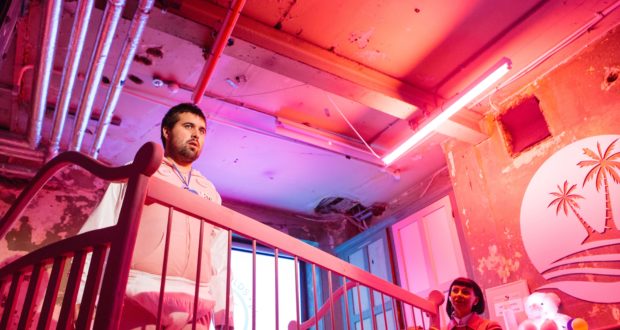Pros: The poignant stories told by the actors about their experiences of what it means to live with a learning disability. Interesting immersive adventure which recreates an institution for people with learning disabilities. Some production aspects are flawed, but definitely worth the experience!
Cons: Too many horror film features makes the set look like a haunted house in an amusement park, undermining the importance of the subject.
Summary
Stars
3 Stars – Good
I would like to make this a democratic review. Yes, I can already see your baffled faces but let me explain before you switch to The Stage. When I left Madhouse Re:Exit I was puzzled. Puzzled because most of the people in my group had a great experience whilst I, on the other hand, was left rather confused. At the end of the show I spoke to some of the other participants and exchanged opinions and emotions. That was one truly rewarding aspect, helping me to understand and see things which I had obviously missed. I would therefore like to incorporate some of those views here so as to better describe this interesting adventure.
Madhouse Re:Exit is an immersive theatre experience produced by Access All Areas which takes place in the labyrinthine basement of the Shoreditch Town Hall. After being given a golden wristband, fifteen other people and I were taken to the corporate-like reception room of an institution for people with learning disabilities called Paradise Fields PLC. We were greeted by a histrionic member of staff dressed in a bubblegum pink suit called Sandra. She showed us some promotional videos of the supposedly excellent, yet in reality patronising and humiliating, care that Paradise Fields provides to its residents. Suddenly an alarm went off and an error message appeared on the screens. Sandra left us alone while she went out to check what was going on and at that moment we saw Patient 36 (David Munns) on the screen, who invited us to do the real tour around the hospital and meet the other Patients. And so the adventure began…
My main objection to the design of the show is the excessive use of horror film features. Panic lights, static TV screens, scattered papers all over the floor, spooky music, creepy sounds… Is all that really necessary? Personally, those elements only added to making the tour seem more like a horror house in an amusement park than an actual institution where patients are cruelly mistreated and humiliated. Perhaps I’m traumatised after accidentally seeing Child’s Play when I was six, but the purpose of having so many scary details in a place that is already terrifying was lost on me. However, another participant told me that they found the red panic light and noise fitting, as it was reminiscent of the kind of shock one goes through when they are in that kind of environment.
It was agreed all round that the best and most poignant part of the tour is when the actors explain their stories and experiences about what it means to live with a learning disability. The Eater (Dayo Koleosho) describes the humiliation of being force fed like an animal; the Baby (Cian Binchy) speaks about how he was treated like a infant, and how his sexuality was denied because people thought he hadn’t developed beyond childhood; the Bird (DJ Hassan) was tied in front of everyone with a straightjacket after a fiery and expressive dance. Their testimonies were not only moving, but a great lesson for those of us who are happy to talk about ‘care in the community,’ but are unresponsive when austerity cuts jeopardise the ability of disabled people to live independently and with dignity. However, the experience fails to make a distinction between the past and present of long-stay hospitals. Although luckily most of these places no longer exist, there are some instances where they have just been replaced with bedroom walls.
On my tour there was a group of artists, some of them with learning disabilities themselves. Their unanimous verdict was that they loved the show. One of them told me that when he was younger he had a similar experience of mistreatment. Also with the group was an art therapist who found the immersive experience powerful and heartbreaking, so much so that she was moved to tears by the end.
My recommendation: forget everything I’ve said and go and experience the show for yourself.
Author: Access All Areas and Max Barton
Director: Nick Llewellyn
Producer: Access All Areas
Box Office: 0207 613 6445
Booking Link: http://www.accessallareastheatre.org/madhouse-reexit
Booking Until: 28 March 2018
 Everything Theatre Reviews, interviews and news for theatre lovers, London and beyond
Everything Theatre Reviews, interviews and news for theatre lovers, London and beyond



